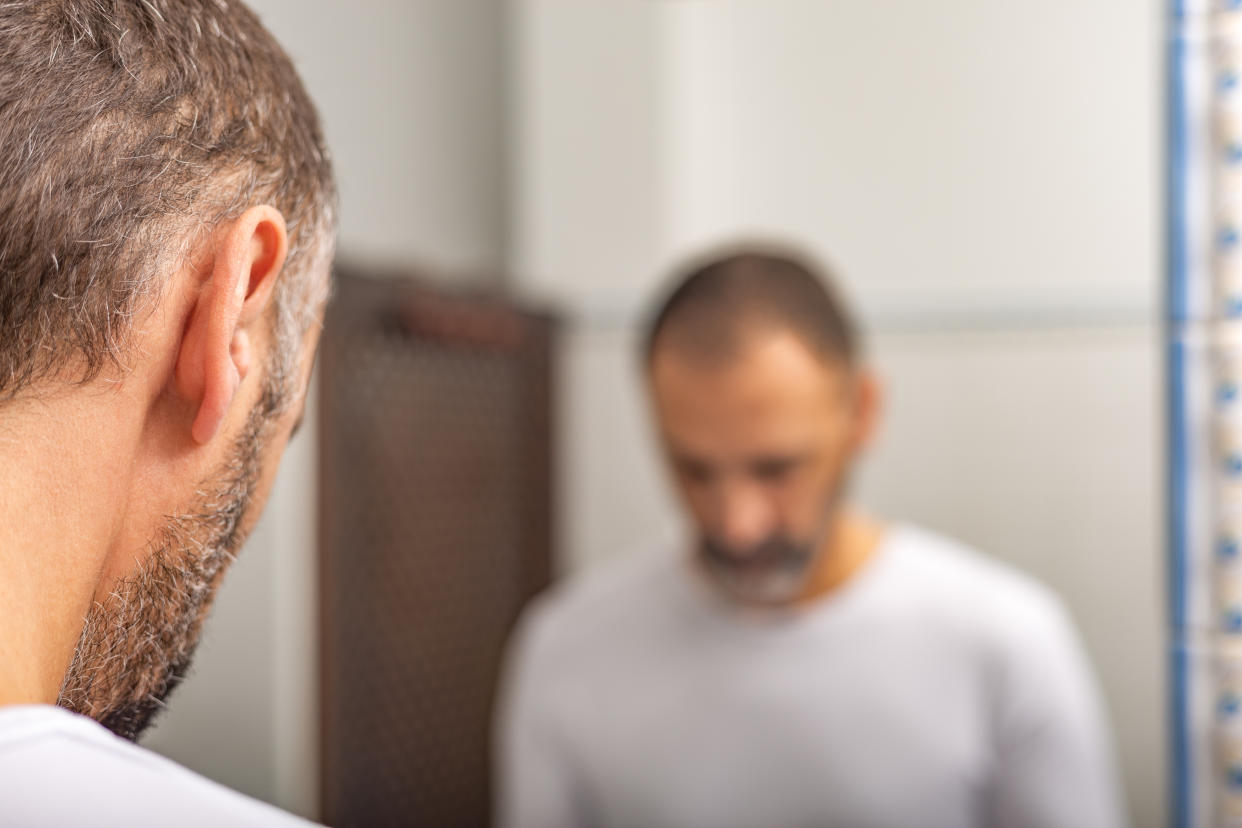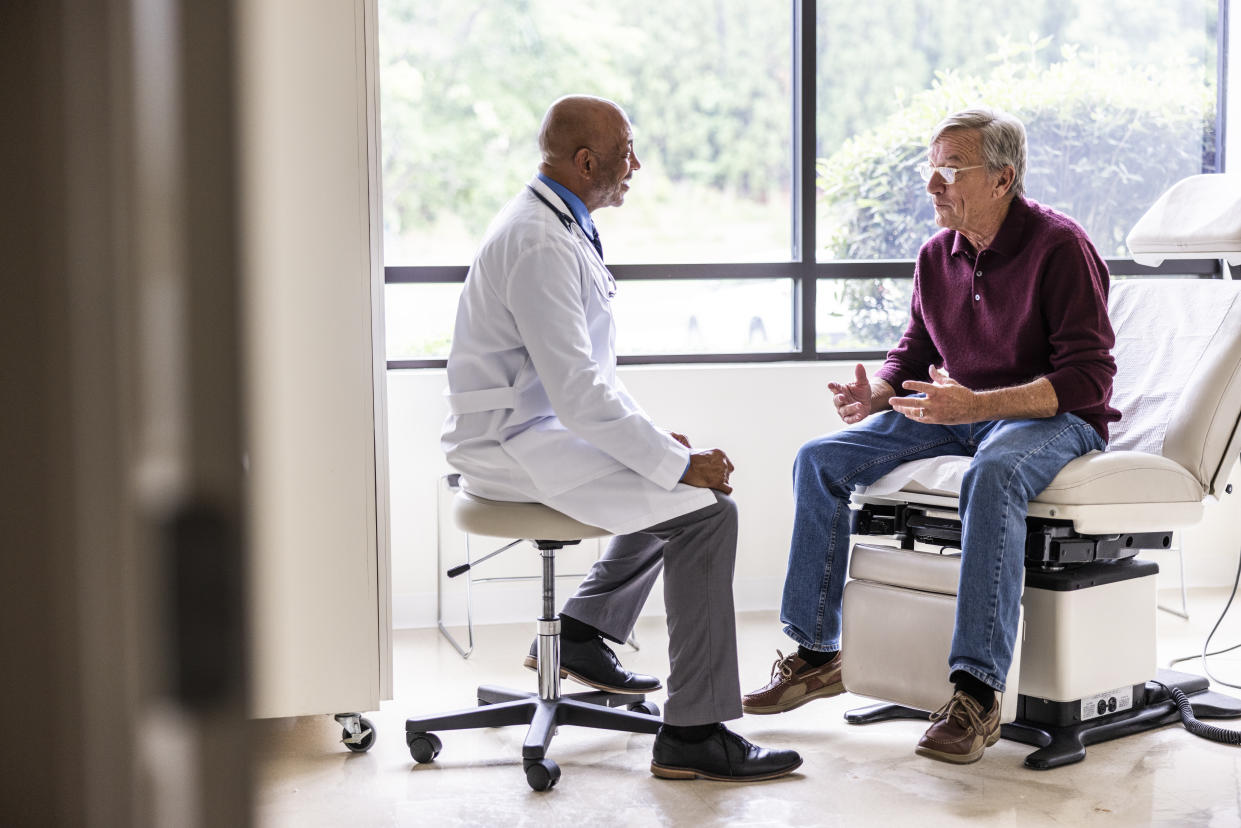7 in 10 men wouldn't go to GP even if they saw blood in their urine

Research has shown that men are less likely than women to seek medical help or advice. But new figures show that a worryingly high proportion of men would delay seeing a doctor even if they saw blood in their urine.
A survey of 2,000 men in the UK, commissioned by The Urology Foundation, revealed that seven in 10 men wouldn’t go straight to a GP if they see blood in their urine, with most looking to self-manage instead.
More than a quarter (26%) said they would turn to the internet for more information and advice, while nearly half (41%) said they would simply drink more water to try and treat the symptom.
Over half said they would only speak to a healthcare professional if it happened regularly - putting their lives at risk by delaying investigation. The survey found that men in Scotland were least likely to book an appointment, while men in London were most likely to do so despite being the least worried about the symptom.
Blood in urine can be a sign of a number of health conditions, from urinary tract infections to kidney stones. However, it could also be a sign of bladder cancer, which more than 10,500 people are diagnosed with each year in the UK.
Rebecca Porta, chief executive of The Urology Foundation, said: "The fact that less than one in three men would speak to a healthcare professional immediately if they saw blood in pee just once is deeply concerning and means they could potentially put their lives at risk.
"A lot of excellent work has been done in recent years to raise awareness of bladder cancer but this data shows there is much more to do.
"We need to break the stigma around men’s health and encourage men to take the time to be health aware and take action. Early detection can save lives and can offer better outcomes - recognising that blood in pee always needs investigation is crucial."
Bladder cancer is the 11th most common cancer in the UK, rising to the 7th most common cancer among men. One in 55 UK males will be diagnosed with bladder cancer in their lifetime, compared to one in 130 UK females, according to Cancer Research UK.
Why do men delay getting medical help?

Medical professionals have long highlighted the issue of men putting off doctor’s visits and seeking help. Previous research shows that men are up to 50% less likely than women to seek medical attention, and 65% say they avoid doing so for as long as possible.
5 common reasons that men give for avoiding seeing their GP:
According to Nuffield Health, there are five common reasons that men give for avoiding seeing their GP. These include:
1. Believing men shouldn’t talk about their health
Dr Asif Naseem of Nuffield Health says 41% of men recall being told that "men don’t complain about health issues" and "boys don’t cry" as children, which can make them less likely to admit when there’s a problem.
"By encouraging male friends and family members to open up and talk in a safe space, we start to challenge these outdated stereotypes and help more men feel comfortable getting help when they need it."
2. Believing things will get better on their own
One study found that more than half (58%) of men have ignored a medical issue in hopes it would resolve itself without having to seek medical attention.
However, experts warn that ignoring a symptom that concerns you can mean missing the opportunity to catch something potentially serious early on.
3. Believing they are wasting their doctor’s time
Dr Naseem points out that, although many people in the UK are concerned their symptoms don’t warrant attention from their GP if it isn’t getting worse or life-threatening, the "purpose of healthcare is to treat health problems".
"The bottom line is that it’s important to access healthcare when you need it, as ignoring symptoms or putting off getting help can mean you eventually require more attention further down the line."
4. Believing they don’t have time
One of the top reasons men give for not going to their doctor is that they are “too busy”. Between work and family life, it can feel like health comes last, but this really shouldn’t be the case.
Instead, making sure regular checkups are part of your routine, particularly as you get older, can help you make time for your health.
5. Believing they will go through ‘embarrassing’ examinations
For many men, just the idea of going through prostate, testicular and rectal examinations can feel "invasive" or "embarrassing". However, these are vital checks to make sure everything is ticking along.
"The reality is that your doctor is a professional who has done your test many times before," Dr Naseem reassures. "They’ll know that some people feel embarrassed or apprehensive, and so they’ll do their best to make you feel comfortable and at ease."
Read more about men's health:
Why men should be more concerned about UTI pain (Yahoo Life UK, 5-min read)
One in 10 men worried their hairline will end their relationship (Yahoo Life UK, 5-min read)
Vegetarian diet could help men with prostate cancer (Yahoo Life UK, 4-min read)


